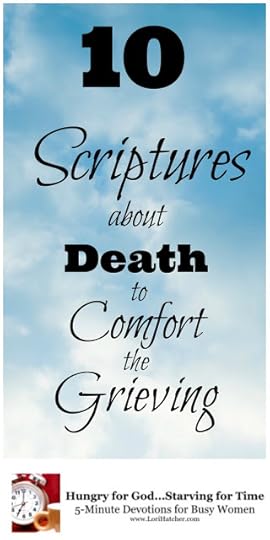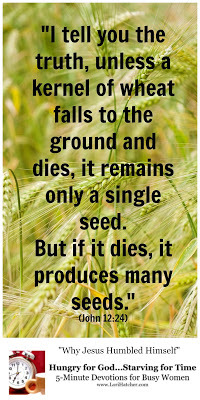Lori Hatcher's Blog: Refresh Blog, page 57
July 30, 2017
Today You Have Two Choices
 We love choices. From the 1970s “Have It Your Way” Burger King jingle to the more than 100 drink options in a Coca Cola Freestyle drink machine, we like to express our preferences and make our choices.
We love choices. From the 1970s “Have It Your Way” Burger King jingle to the more than 100 drink options in a Coca Cola Freestyle drink machine, we like to express our preferences and make our choices. Perhaps as a nod to this characteristic of human nature, God also gives us choices. Unlike 100 drink flavors in the drink machine at Moe’s however, he makes it simple. In life, we have only two choices, and these options go way back to a story in 2 Chronicles 20.
At the time, godly king Jehoshaphat sat on the throne of Judah. As is often the case with godly rulers, it wasn’t long before enemies arrived to try to mess up his good thing. Judah was a shadow of her former self in those days, with an army no one in his right mind would boast about. When the big guys came knocking, King Jehoshaphat knew they were in trouble.
“A great multitude is coming against you from beyond the sea,” the warning stated. “. . . and Jehoshaphat feared” (2 Chr. 20:2-3). He gathered the leaders from the surrounding cities, and together they sought the Lord. “. . . we have no power against this great multitude that is coming against us,” he prayed, “nor do we know what to do, but our eyes are upon you.”
Almost immediately, God responded to Jehoshaphat’s prayer through one of the prophets. “Do not be afraid or dismayed because of this great multitude, for the battle is not yours, but God’s . . . . You will not need to fight in this battle. Position yourselves, stand still and see the salvation of the Lord, who is with you” (v. 15, 17).
With these words, God gave Jehoshaphat a choice: believe the impossibility of the circumstances or believe God’s Word.
We face the same choice every day of our lives. When faced with challenging (and sometimes overwhelming) circumstances, will we believe what we see with our eyes or will we trust in God’s promises?
You know the rest of the story. “Jehoshaphat bowed his head with his face to the ground, and all Judah and the inhabitants of Jerusalem bowed before the Lord, worshiping the Lord” (v. 18).
The next morning, per God’s instructions, they marched out to face the enemy with music on their lips and praise in their mouths. “Praise the Lord,” they sang, “for his mercy endures forever.”
Without lifting a spear or a sword, the Israelites won a great victory that day, because the Lord fought for them. By praying, seeking God’s face, and believing his promises, they released the power available in heaven and brought it to earth for a great victory.
The result?
“The fear of God was on all the kingdoms of those countries when they heard that the Lord had fought against the enemies of Israel.”
 Now it’s your turn. What enemy are you facing right now? What circumstance steals the sleep from your night and the peace from your days? You have two choices: believe the seemingly-impossibility of the circumstances or believe God’s promises.
Now it’s your turn. What enemy are you facing right now? What circumstance steals the sleep from your night and the peace from your days? You have two choices: believe the seemingly-impossibility of the circumstances or believe God’s promises. If you need a few more promises for your faith arsenal, here are some of my favorites:
“Call to me in the day of trouble; I will deliver you, and you will honor me” (Psalm 50:15).
“The LORD will fight for you; you need only to be still” (Exodus 14:14).
“So do not fear, for I am with you; do not be dismayed, for I am your God. I will strengthen you and help you; I will uphold you with my righteous right hand” (Isaiah 41:10).
“When you pass through the waters, I will be with you; and when you pass through the rivers, they will not sweep over you. When you walk through the fire, you will not be burned; the flames will not set you ablaze” (Isaiah 43:2).
“However, as it is written: "No eye has seen, no ear has heard, no mind has conceived what God has prepared for those who love him" (I Cor. 2:9).
“Now to him who is able to do immeasurably more than all we ask or imagine, according to his power that is at work within us, to him be glory in the church and in Christ Jesus throughout all generations, for ever and ever! Amen” (Eph. 3:20-21).
If you enjoyed this post, why not subscribe? I'll send you twice-weekly 5-minute devotions to help nourish your soul.
Because women need to connect with God in the craziness of life.
Enter your email address and VALIDATE the Feedburner email sent to your inbox.
Delivered by FeedBurner
If this post was meaningful to you, would you consider sharing it with a friend by clicking on one of the buttons below? Did you know you can receive bi-weekly Hungry for God posts sent directly to your email inbox? Visit http://www.lori-benotweary.blogspot.com and click on the link in the right hand corner to Subscribe Via Email.
Copyright 2012 by Lori Hatcher
Published on July 30, 2017 10:49
July 26, 2017
Reflecting on the Shadowlands - How Heaven's a Lot Like Cantaloupe
My first cantaloupe came from an Avon catalog.
 But first, I should tell you that as a Portuguese/Italian Rhode Islander, my culinary upbringing was heavy on pasta and pastrami and woefully lacking in produce. Mom would bring a shrink-wrapped Styrofoam tray of green grapes home from the grocery store once a week, and my sisters and I would devour them in one day. The upstate of Rhode Island produced bumper crops of apples in the fall, which we enjoyed in pie and applesauce. And when cherries were in season, we’d feast on the bounty of my godfather’s tree.
But first, I should tell you that as a Portuguese/Italian Rhode Islander, my culinary upbringing was heavy on pasta and pastrami and woefully lacking in produce. Mom would bring a shrink-wrapped Styrofoam tray of green grapes home from the grocery store once a week, and my sisters and I would devour them in one day. The upstate of Rhode Island produced bumper crops of apples in the fall, which we enjoyed in pie and applesauce. And when cherries were in season, we’d feast on the bounty of my godfather’s tree.Other than that, I have little recollection of fruit. And except for the annual Fourth of July watermelon, my early life was melon-less.
Perhaps this is why I found the contents of my mom’s Avon order so intriguing. Nestled among the lipstick tubes and Skin So Soft was a plastic cantaloupe. I didn’t know what it was at the time, having never seen one, but when I unscrewed the top of the orb, I found a treasure.
Cradled in the cavity were orange and green balls that smelled like heaven. I was too little to read, so Mom read the package for me. Cantaloupe- and honeydew-scented soap balls infuse your bathroom with the sweet scents of summer.
Grabbing a ball in each hand, I lifted them to my nose and breathed deeply. The scent of morning air, sunshine, and juicy goodness exploded in my head. Never in my short life had I smelled anything so delicious.
Now I live in the land of sunshine. Wide fields of melons bridge the gap between the city and the country. On a good day at the farmer’s market, if I haggle hard with the man in the pickup truck, I can take home a cantaloupe the size of a basketball for a dollar. And now, instead of having to be content with just smelling its juicy goodness, I can feast to my heart’s delight.
I think heaven’s going to be a lot like cantaloupe.
Some days I look around me, and my heart swells with joy. Awe-inspired tears fill my eyes as I witness the beauty of a sunrise on the ocean or a blanket of clouds over the mountains. Laughter takes my breath away when a moment of family fun erupts into a hiccupy free for all. I breathe in the sweet smell of my granddaughter’s hair as I rock her to sleep and think, it doesn’t get any better than this.
But it does. Oh, it does.
C. S. Lewis accurately described this world as just the Shadowlands. Listen to his description from the final chapter of The Last Battle:
“There was a real railway accident,” said Aslan softly. “Your father and mother and all of you are – as you used to call it in the Shadowlands–dead. The term is over: the holidays have begun. The dream is ended: this is the morning.
“And as He spoke He no longer looked to them like a lion; but the things that began to happen after that were so great and beautiful that I cannot write them. And for us this is the end of all the stories, and we can most truly say that they all lived happily ever after. But for them it was only the beginning of the real story. All their life in this world and all their adventures in Narnia had only been the cover and the title page: now at last they were beginning Chapter One of the Great Story which no one on earth has read: which goes on forever: in which every chapter is better than the one before.”

Now listen to the biblical parallel:
“Then I saw a new heaven and a new earth, for the first heaven and the first earth had passed away, and there was no longer any sea. I saw the Holy City, the new Jerusalem, coming down out of heaven from God, prepared as a bride beautifully dressed for her husband. And I heard a loud voice from the throne saying,
“Now the dwelling of God is with men, and he will live with them. They will be his people, and God himself will be with them and be their God. He will wipe every tear from their eyes. There will be no more death or mourning or crying or pain, for the old order of things has passed away.
“He who was seated on the throne said, ‘I am making everything new! Then he said, ‘Write this down, for these words are trustworthy and true’” (Revelation 21:1-5).
Like the soapy cantaloupe balls I enjoyed as a child were merely a shadow of the real thing, so our wonderful, beautiful, awe-inspiring world is just a pale imitation of the reality that awaits us in heaven.
Because of this, we can have hope.
If you’re struggling today, I pray the reality of what we have to look forward to in heaven will encourage you to persevere here on the earth. May the Apostle Paul’s words in 2 Corinthians 4:17-18 be a reminder for us all:
“For our light and momentary troubles are achieving for us an eternal glory that far outweighs them all. So we fix our eyes not on what is seen, but on what is unseen, since what is seen is temporary, but what is unseen is eternal.”
Even so, come quickly, Lord Jesus.
Now it’s your turn. What aspect of earth gives you a foreshadowing of heaven? Share your thoughts in the comment box and bless us all.
If you enjoyed this post, why not subscribe? I'll send you twice-weekly 5-minute devotions to help nourish your soul.
Because women need to connect with God in the craziness of life.
Enter your email address and VALIDATE the Feedburner email sent to your inbox.
Delivered by FeedBurner

If this post was meaningful to you, would you consider sharing it with a friend by clicking on one of the buttons below? Did you know you can receive bi-weekly Hungry for God posts sent directly to your email inbox? Visit http://www.lori-benotweary.blogspot.com and click on the link in the right hand corner to Subscribe Via Email.
Copyright 2012 by Lori Hatcher
Published on July 26, 2017 18:34
July 23, 2017
What Happened When We Asked for 25
“I believe God is leading me to pray for 25 children,” Robin, our VBS director, told us the week before VBS. Twenty-five may not sound like many, but for our church, which has mostly senior adults and empty-nesters, it was a bold prayer.
 So we began to ask. “Lord, please send us 25 children. We promise to love them, teach them your Word, and tell them about Jesus. We’ve planned the crafts, bought the snacks, practiced the lessons, and invited the neighborhood. We’ve done all we can do. Now you’ve got to send the children.”
So we began to ask. “Lord, please send us 25 children. We promise to love them, teach them your Word, and tell them about Jesus. We’ve planned the crafts, bought the snacks, practiced the lessons, and invited the neighborhood. We’ve done all we can do. Now you’ve got to send the children.” On the Sunday night before VBS began, our prayer group gathered once more to pray for 25 children.
“Lord, send the children who most need to hear the good news about Jesus,” we said as we ended our prayer time.
The next morning, two children came.
“Well, Lord,” we prayed afterward, “we asked you to send the children who most needed to hear about you. Your Word says you always answer prayers, so these two must have been the ones who most needed to hear about you. Thank you for them.”

The next day the two came back, and the Lord sent a few more children from a nearby daycare center.
“Thank you, Lord, for the children you sent today,” we prayed. “But Lord, we’re still trusting you for 25.”
On the third and fourth day, more children from the daycare came. We sang songs, taught Bible lessons, and continued to share the Gospel.
On the fifth and final day, eighteen enthusiastic children poured from the daycare bus. Three women brought their grandchildren, and a church member picked up a neighbor’s child.
“Josephus,” our Bible study leader stood in the corner during opening assembly and counted. I watched his lips moving . . . 22, 23, 24.
“There are twenty-four children here today” he whispered in excitement.
“Twenty-four?” I whispered back, “that’s wonderful.” But inside I was thinking, twenty-four, Lord? Why not twenty-five? You told Robin to ask for 25 children. You can do anything. One more child wouldn’t have been hard for you.
 Count the little heads -- they're all there! 25 precious children.Just then, out of the corner of my eye, I saw the back door swing open. The freckle-faced son of one of our newest church families sauntered in and took his place on the front row. Realizing what had just happened, I glanced at Josephus, who was grinning widely.
Count the little heads -- they're all there! 25 precious children.Just then, out of the corner of my eye, I saw the back door swing open. The freckle-faced son of one of our newest church families sauntered in and took his place on the front row. Realizing what had just happened, I glanced at Josephus, who was grinning widely. Twenty-five he mouthed.
Twenty-five indeed.
Warm tears pricked my eyes, and an overwhelming sense of gratitude washed over me. God had answered two prayers for our little church. First, he sent us the children who most needed to hear the Gospel. Second, he gave our VBS director the vision and faith to ask for 25 children and fulfilled the vision he had planted in her heart.
As I gazed at the pews full of children singing praise songs to Jesus, I realized anew the truth of 2 Corinthians 1:20:
“For no matter how many promises God has made, they are ‘Yes’ in Christ. And so through him the ‘Amen’ is spoken by us to the glory of God.”
God, grant us ears to hear God’s will, faith to pray it into being, and courage to not lose heart when the answer is slow in coming. In the strong name of Jesus I pray, Amen.
If you enjoyed this post, why not subscribe? I'll send you twice-weekly 5-minute devotions to help nourish your soul.
Because women need to connect with God in the craziness of life.
Enter your email address and VALIDATE the Feedburner email sent to your inbox.
Delivered by FeedBurner
If this post was meaningful to you, would you consider sharing it with a friend by clicking on one of the buttons below? Did you know you can receive bi-weekly Hungry for God posts sent directly to your email inbox? Visit http://www.lori-benotweary.blogspot.com and click on the link in the right hand corner to Subscribe Via Email.
Copyright 2012 by Lori Hatcher
Published on July 23, 2017 18:44
July 19, 2017
The Prisoners Are Listening -- What Happens When We Praise God in Suffering
I had a most interesting conversation with a friend. I hadn’t seen Debra in years, and we were catching up on each other's lives.
“How’s everything going?” I asked.
“It’s going well,” she responded. “Steve lost his job several weeks ago.”
Normally when someone tells me her husband has lost his job, the conversation doesn’t begin with, “It’s going well.” Like chocolate syrup on barbecue, the two just don’t normally go together.
“I’m sorry to hear about Steve’s job,” I said, but before I could say more, she interrupted me.
“It’s OK. I remember years ago when your husband lost his job. You’d come into Bible study, and we’d ask you how it was going. Every week you’d have a new story of how God was taking care of you.How he’d met your need that week. I know if he took care of y’all, he’ll take care of us.”
I thought of Debra as I read Acts 16.
 Paul and Silas didn't know others were watching either. They were just faithfully living out their calling, preaching and teaching the gospel in Philippi. Many were coming to faith in Christ. When they exorcised a demon from a slave girl, however, the tide of popular opinion turned against them.
Paul and Silas didn't know others were watching either. They were just faithfully living out their calling, preaching and teaching the gospel in Philippi. Many were coming to faith in Christ. When they exorcised a demon from a slave girl, however, the tide of popular opinion turned against them.
The slave girl’s ability to foretell the future had given her masters a steady cash flow. Now it was gone. And boy were they mad.
Hauling them before the magistrates, they levied charges against them. The officials were eager to comply—these foreigners were upsetting the balance of their city. Beating them viciously, they confined Paul and Silas to the deepest part of the jail, stretched their legs out as far as they could go, and locked them in the stocks.
What did Paul and Silas do? Whine and complain because they were being punished for doing good? Become angry at God for not protecting them? Turn their backs on him because he wasn’t holding up his end of the bargain?
“But at midnight, Paul and Silas were praying and singing hymns to God . . .”
They glorified God. Not despite their troubles, but in their troubles.
And what happened next?
“. . . and the prisoners were listening to them.”
When a believer experiences a trial and continues to praise and glorify God, people take notice. They listen to what you have to say, because your suffering has earned you the right to say it.
People expect believers to praise God when everything is going well. Why wouldn’t they? Like Satan said in Job 1:10, “Why shouldn’t Job serve you? You’ve blessed everything his hand has touched.”
“But take your hand of blessing away,” Satan hissed, “and see if he doesn’t curse you to your face.”
People who are prisoners, chained in hopeless captivity to the world, the flesh, and the devil, recognize true freedom when they see it. And even if they don’t appear to be watching, like my friend Debra so many years ago, they are.
They’re listening to how you speak about God. They’re watching for the next chapter, to see what’s going to happen. And deep down inside, even though they may be skeptical or disbelieving, they’re hoping God will come through for you.
Somehow, deep inside the jail cells of their hearts, they know that maybe, just maybe, if God rescues you, he can also rescue them.
And that’s exactly what happened.
“Suddenly, there was a great earthquake, so that the foundations of the prison were shaken; and immediately all the doors were opened and everyone’s chains were loosed.”
If you’re going through a trial today, be aware that others are watching you. And they can spot a fake a mile away. It’s not enough to paste on a Bible promise and a plastic smile and lie through your teeth. You’ve got to own the truth that God is in control, and he’s going to use everything in your life for your good and his glory.
 What kind of kingdom ambassador are you? If you're struggling to trust God, check out this link of 50 Promises of God. Or read through the book of Psalms, writing down every attribute of God you find. Coming face to face with God will grow your faith and build your trust.
What kind of kingdom ambassador are you? If you're struggling to trust God, check out this link of 50 Promises of God. Or read through the book of Psalms, writing down every attribute of God you find. Coming face to face with God will grow your faith and build your trust.
The prisoners are listening.
And God wants to use you to help set them free.
If you enjoyed this post, why not subscribe? I'll send you twice-weekly 5-minute devotions to help nourish your soul.
Because women need to connect with God in the craziness of life.
Enter your email address and VALIDATE the Feedburner email sent to your inbox.
Delivered by FeedBurner
If this post was meaningful to you, would you consider sharing it with a friend by clicking on one of the buttons below? Did you know you can receive bi-weekly Hungry for God posts sent directly to your email inbox? Visit http://www.lori-benotweary.blogspot.com and click on the link in the right hand corner to Subscribe Via Email.
Copyright 2012 by Lori Hatcher
“How’s everything going?” I asked.
“It’s going well,” she responded. “Steve lost his job several weeks ago.”
Normally when someone tells me her husband has lost his job, the conversation doesn’t begin with, “It’s going well.” Like chocolate syrup on barbecue, the two just don’t normally go together.
“I’m sorry to hear about Steve’s job,” I said, but before I could say more, she interrupted me.
“It’s OK. I remember years ago when your husband lost his job. You’d come into Bible study, and we’d ask you how it was going. Every week you’d have a new story of how God was taking care of you.How he’d met your need that week. I know if he took care of y’all, he’ll take care of us.”
I thought of Debra as I read Acts 16.
 Paul and Silas didn't know others were watching either. They were just faithfully living out their calling, preaching and teaching the gospel in Philippi. Many were coming to faith in Christ. When they exorcised a demon from a slave girl, however, the tide of popular opinion turned against them.
Paul and Silas didn't know others were watching either. They were just faithfully living out their calling, preaching and teaching the gospel in Philippi. Many were coming to faith in Christ. When they exorcised a demon from a slave girl, however, the tide of popular opinion turned against them. The slave girl’s ability to foretell the future had given her masters a steady cash flow. Now it was gone. And boy were they mad.
Hauling them before the magistrates, they levied charges against them. The officials were eager to comply—these foreigners were upsetting the balance of their city. Beating them viciously, they confined Paul and Silas to the deepest part of the jail, stretched their legs out as far as they could go, and locked them in the stocks.
What did Paul and Silas do? Whine and complain because they were being punished for doing good? Become angry at God for not protecting them? Turn their backs on him because he wasn’t holding up his end of the bargain?
“But at midnight, Paul and Silas were praying and singing hymns to God . . .”
They glorified God. Not despite their troubles, but in their troubles.
And what happened next?
“. . . and the prisoners were listening to them.”
When a believer experiences a trial and continues to praise and glorify God, people take notice. They listen to what you have to say, because your suffering has earned you the right to say it.
People expect believers to praise God when everything is going well. Why wouldn’t they? Like Satan said in Job 1:10, “Why shouldn’t Job serve you? You’ve blessed everything his hand has touched.”
“But take your hand of blessing away,” Satan hissed, “and see if he doesn’t curse you to your face.”
People who are prisoners, chained in hopeless captivity to the world, the flesh, and the devil, recognize true freedom when they see it. And even if they don’t appear to be watching, like my friend Debra so many years ago, they are.
They’re listening to how you speak about God. They’re watching for the next chapter, to see what’s going to happen. And deep down inside, even though they may be skeptical or disbelieving, they’re hoping God will come through for you.
Somehow, deep inside the jail cells of their hearts, they know that maybe, just maybe, if God rescues you, he can also rescue them.
And that’s exactly what happened.
“Suddenly, there was a great earthquake, so that the foundations of the prison were shaken; and immediately all the doors were opened and everyone’s chains were loosed.”
If you’re going through a trial today, be aware that others are watching you. And they can spot a fake a mile away. It’s not enough to paste on a Bible promise and a plastic smile and lie through your teeth. You’ve got to own the truth that God is in control, and he’s going to use everything in your life for your good and his glory.
 What kind of kingdom ambassador are you? If you're struggling to trust God, check out this link of 50 Promises of God. Or read through the book of Psalms, writing down every attribute of God you find. Coming face to face with God will grow your faith and build your trust.
What kind of kingdom ambassador are you? If you're struggling to trust God, check out this link of 50 Promises of God. Or read through the book of Psalms, writing down every attribute of God you find. Coming face to face with God will grow your faith and build your trust.The prisoners are listening.
And God wants to use you to help set them free.
If you enjoyed this post, why not subscribe? I'll send you twice-weekly 5-minute devotions to help nourish your soul.
Because women need to connect with God in the craziness of life.
Enter your email address and VALIDATE the Feedburner email sent to your inbox.
Delivered by FeedBurner
If this post was meaningful to you, would you consider sharing it with a friend by clicking on one of the buttons below? Did you know you can receive bi-weekly Hungry for God posts sent directly to your email inbox? Visit http://www.lori-benotweary.blogspot.com and click on the link in the right hand corner to Subscribe Via Email.
Copyright 2012 by Lori Hatcher
Published on July 19, 2017 16:38
July 16, 2017
Will Your Marriage Be the Last One Standing?
I remember how it felt to be the last one standing when the stomach bug ravaged our family.
 I desperately sprayed Lysol on everything that didn’t breathe (and maybe a few things that did). I bleached hard surfaces, laundered bedding, and washed my hands until they cracked.
I desperately sprayed Lysol on everything that didn’t breathe (and maybe a few things that did). I bleached hard surfaces, laundered bedding, and washed my hands until they cracked. Not me, I vowed. I will not get sick. It’s not going to get me.
I felt the same way recently when I heard the news that two more of our friends had separated. Married longer than we’ve been, they appeared to have a stable marriage. Now they’re living in different houses, deciding if their marriage is worth fighting for.
Hearing the news makes me want to reach for the Matrimonial Lysol and spray anything that dares get within 10 feet of my marriage. I want to scrub away the lies we’re tempted to believe – that someone else will understand us better, that a little pornography doesn’t hurt, that we deserve someone more exciting. I want to launder away the soil of selfishness, laziness, and pride. Most of all, I want to wash my hands of the excuses we make for not loving each other like Christ loves us.
I don’t want my marriage to be the last one standing. My husband and I want to be part of a long line of lifers—couples who have navigated the waters of marriage from “I do” to “’til death do us part.” I want our marriage to grow sweeter as the years go by, not sour or cynical.
 Here we are on our wedding day, Dec. 28, 1984I want us to hold hands when we’re 90, sneak kisses when we think no one’s looking, and fall asleep in the same bed every night.
Here we are on our wedding day, Dec. 28, 1984I want us to hold hands when we’re 90, sneak kisses when we think no one’s looking, and fall asleep in the same bed every night. I want my husband to still think I’m pretty when wrinkles and grey hair replace smooth skin and highlights. I want to always admire his muscles and tell him how handsome he looks. I want to pray with him, not against him.
Now more than ever, I want to love my husband when it’s easy and when it’s hard, because our kids are watching. And our grandkids. And God. They all know neither of us is easy to live with. But we’re going to keep our commitment to each other, because we promised.
And about that promise – the one we made before God. I don’t want one day to look at Jesus’ nail-scarred hands and pierced side and say, “My marriage was too hard. The sacrifice was too great.”
Our marriages are the best examples to the world of what committed love looks like. They're reflections of God’s love toward us – unconditional and never-ending. This is why we can’t give up.
 We have to continue to become the husband or wife God intends for us to be. We have to go the extra mile, and the next, and the next. We must grab hold of our marriages and not let go – to be like Jacob and say, “I will not let you go until you bless me!” And we must forgive - seventy times seven.
We have to continue to become the husband or wife God intends for us to be. We have to go the extra mile, and the next, and the next. We must grab hold of our marriages and not let go – to be like Jacob and say, “I will not let you go until you bless me!” And we must forgive - seventy times seven.Finally, we must pray circles around our marriages and our mates every day. This is spiritual warfare, and we can no longer remain ignorant or disengaged. Satan is prowling, seeking whom he may devour. He wants it to be us.
I refuse to be the last one standing. It’s time to stand up and be counted.
"(We) can do all things through Christ who gives (us) strength" (Phil. 4:13).
Will you join me?
If you leave your name in the comment box. I’d be honored to pray for your marriage today.
And if you need another reminder to fight and pray, take a few minutes and watch this clip from War Room, "It's Time to Fight." If you're reading by email, click here to be challenged and inspired.
If you enjoyed this post, why not subscribe? I'll send you twice-weekly 5-minute devotions to help nourish your soul.
Because women need to connect with God in the craziness of life.
Enter your email address and VALIDATE the Feedburner email sent to your inbox.
Delivered by FeedBurner
If this post was meaningful to you, would you consider sharing it with a friend by clicking on one of the buttons below? Did you know you can receive bi-weekly Hungry for God posts sent directly to your email inbox? Visit http://www.lori-benotweary.blogspot.com and click on the link in the right hand corner to Subscribe Via Email.
Copyright 2012 by Lori Hatcher
Published on July 16, 2017 18:52
July 12, 2017
10 Scriptures about Death to Comfort the Grieving
 I didn’t fully understand the depths of grief until the year my family lost two sisters and a brother within eight months.
I didn’t fully understand the depths of grief until the year my family lost two sisters and a brother within eight months. My brother-in-law lost a five-year battle with cancer, my sister died an agonizing death from a toxic clash of prescribed medications, and my sister-in-law died suddenly from a triple brain aneurysm.
Before 2010 I had a head knowledge of death, but afterward, I’d been baptized by fire. As one family member eloquently described, “I felt like my body had been cut open and all my happiness pulled out.”
God comforted us through those horrible days in many different ways. Friends made hospital visits and attended funerals. Distant relatives emailed sweet expressions of sympathy. Fellow church members sent cards and casseroles. Our greatest source of comfort, however, was the Bible verses we read in the days surrounding our loved ones’ deaths.
To read the ten verses we found especially meaningful, click here view the slideshow, "10 Scriptures about Death to Comfort the Grieving," on Crosswalk.com.
Or follow the link: http://www.crosswalk.com/slideshows/10-scriptures-about-death-to-comfort-the-grieving.html.
And if you know someone who's struggling through the throes of grief, I'd be honored if you'd share this post with them.
If you enjoyed this post, why not subscribe? I'll send you twice-weekly 5-minute devotions to help nourish your soul.
Because women need to connect with God in the craziness of life.
Enter your email address and VALIDATE the Feedburner email sent to your inbox.
Delivered by FeedBurner

If this post was meaningful to you, would you consider sharing it with a friend by clicking on one of the buttons below? Did you know you can receive bi-weekly Hungry for God posts sent directly to your email inbox? Visit http://www.lori-benotweary.blogspot.com and click on the link in the right hand corner to Subscribe Via Email.
Copyright 2012 by Lori Hatcher
Published on July 12, 2017 18:52
July 9, 2017
How to Quench the Flames of Fear
Before my friend said a word, I knew something was wrong.
She didn’t meet my eyes when I greeted her, and her normally bright smile sagged like a limp balloon. Taking her by the hand, I led her into one of the side rooms of the building, away from curious eyes and listening ears.
“What’s going on?” I asked gently. Silent tears filled her eyes.
“I haven’t felt well for months,” she began. “I thought it was just reflux or indigestion . . . then I started losing weight. They did an MRI last Friday. I’m waiting on the results.”
Her eyes met mine, and before she said the words, I knew what was in her heart.
“I’m scared.”
 I knew that look, because I’ve seen it in the mirror – fear, terrible fear that squeezes your heart and takes your breath away. Capable of driving every rational thought out of your head and replacing them with spinning nightmares, it makes you want to run away. But there’s no place to run, because IT is everywhere.
I knew that look, because I’ve seen it in the mirror – fear, terrible fear that squeezes your heart and takes your breath away. Capable of driving every rational thought out of your head and replacing them with spinning nightmares, it makes you want to run away. But there’s no place to run, because IT is everywhere. The last time I felt fear like that, I took to the streets. Shoving my feet into my running shoes and lacing them tightly, I knew I had to go somewhere – anywhere.
“Lord,” I prayed. “I’m afraid. I don’t know what to do, and this looks bad. Please help me.”
Call Cathy, God’s still, small voice said.
Cathy? Yes! Cathy. Cathy would understand. Cathy’s been where I’ve been. She’s gone toe-to-toe with this giant and lived to tell the story.
Shoving my headphones into my ears and dialing the phone, I prayed she’d answer. When she did, I blurted out my story, panic squeezing my throat, making it hard to push the words out. Hard even to breathe.
Cathy listened quietly, then said the words I needed most. “Let me pray for you.”
Her prayer changed nothing about my circumstances – at least not immediately – but it brought about a marvelous transformation in my heart. As Cathy prayed, she reminded me of what fear had made me forget:
That God saw my circumstances.
That he was able to work in ways I could only imagine.
That his resources were unlimited.
And that he hears and answers prayer.
The panic that had taken my breath away subsided, and by the end of her prayer, my heartbeat had returned to normal. Even better, I felt hopeful.
Thinking back on the precious gift Cathy gave me that day, I knew what to do to help my frightened friend.
“Jackie,” l said, “let’s pray.”
 Like Cathy’s prayer for me, my words didn’t change anything about Jackie’s immediate circumstances, but they reminded her God not only knew about her need, but he cared. And he had the power to work in her life.
Like Cathy’s prayer for me, my words didn’t change anything about Jackie’s immediate circumstances, but they reminded her God not only knew about her need, but he cared. And he had the power to work in her life. So the next time you face a frightening situation, or you encounter someone who is, pray. More than anything else, prayer will take a fire hose to the flame of fear and set you on the path to comfort and peace.
“Do not be anxious about anything, but in everything, by prayer and petition, with thanksgiving, present your requests to God. And the peace of God, which transcends all understanding, will guard your hearts and your minds in Christ Jesus” (Phil. 4:6-7)
Now it’s your turn. How have you experienced the peace that comes through prayer? Leave a comment below and share your story.
If you enjoyed this post, why not subscribe? I'll send you twice-weekly 5-minute devotions to help nourish your soul.
Because women need to connect with God in the craziness of life.
Enter your email address and VALIDATE the Feedburner email sent to your inbox.
Delivered by FeedBurner
If this post was meaningful to you, would you consider sharing it with a friend by clicking on one of the buttons below? Did you know you can receive bi-weekly Hungry for God posts sent directly to your email inbox? Visit http://www.lori-benotweary.blogspot.com and click on the link in the right hand corner to Subscribe Via Email.
Copyright 2012 by Lori Hatcher
Published on July 09, 2017 18:46
July 5, 2017
Why Child-like Prayers Work

I’ve never seen a child eat with so much enthusiasm. Like a squirrel to an oak tree, Caroline had moved from across the kitchen to my side. A tug on my leg induced me to pick her up and plop her on the counter beside me while I carved up the fat, green watermelon.
“Mmmm. Mmmm,” she purred, eagerly watching as I raised the knife and split the striped orb in half. Before I could cut the first slice, she had reached an eager hand into its wet, pink center. I handed her a bite-sized morsel. Cramming it into her mouth and chomping down, she squirted a pink river down her chin and onto the front of her t-shirt. “Mmmmm,” she said again, reaching for another.
We sat there for a while, me cutting the watermelon into little pieces and she happily eating them. Finally, her tiny tummy full, she wiggled to the edge of the counter so I could set her back onto the floor. Off she ran, satisfied and happy.
Jennifer Kennedy Dean, in Live a Praying Life , describes a similar situation. “A child simply assumes that the need or desire is potent enough to speak for itself. All that is required is to bring that need to Mom’s or Dad’s (or Gigi’s) attention. The request assumes the answer. The child’s only thought is to bring the need to the source of supply.”
Her observation made me realize that I often treat God as a reluctant giver instead of an abundant provider. Caroline helped me better understand God’s heart toward me.
When I realized Caroline was hungry, I eagerly met her need. My supply was abundant, and I fed her with a liberal, generous hand. I didn’t resent her request, nor did I find it burdensome. In contrast, it made me happy that she came to me. She trusted me to satisfy her desire. I loved feeding her.
God the Father feels the same way about us. He invites us, nay, expects us to bring our needs to his attention. His supply is ample, and his heart benevolent. He smiles when we push back from his table satisfied and happy.
It’s no surprise, then, that Jesus told his disciples, “. . . unless you change and become like little children, you will never enter the kingdom of heaven” (Mat. 18:3).
Dean writes, “You don’t need to build a theological case for why God should want to meet your need. He wants to meet your need because He’s your daddy, and you are the apple of His eye.”
Father, forgive us for treating you more like a deadbeat dad than a generous father. Help us trust you with the eager, sure confidence of a little child. When we forget, remind us that you are a father who loves to give good gifts to his children. Grow our faith. Show us your ways. Lead us ever deeper into the ocean of your love. In the strong name of Jesus we pray, Amen.
If you enjoyed this post, why not subscribe? I'll send you twice-weekly 5-minute devotions to help nourish your soul.
Because women need to connect with God in the craziness of life.
Enter your email address and VALIDATE the Feedburner email sent to your inbox.
Delivered by FeedBurner
If this post was meaningful to you, would you consider sharing it with a friend by clicking on one of the buttons below? Did you know you can receive bi-weekly Hungry for God posts sent directly to your email inbox? Visit http://www.lori-benotweary.blogspot.com and click on the link in the right hand corner to Subscribe Via Email.
Copyright 2012 by Lori Hatcher
Published on July 05, 2017 19:17
July 2, 2017
Sincerity Isn't Enough - What God Says About Worship
Like every other event gone bad, the celebration started well.
 People gathered from all over the land. Singers and musicians, their hearts full of joy, led in songs of praise. A brand new cart, pulled by two strong oxen, stood ready. King David had sought the wisdom of the people, and all had agreed – it was time for the ark of God, the place where God’s presence dwelt, to return to Jerusalem. The Israelites’ hearts overflowed with happiness and excitement.
People gathered from all over the land. Singers and musicians, their hearts full of joy, led in songs of praise. A brand new cart, pulled by two strong oxen, stood ready. King David had sought the wisdom of the people, and all had agreed – it was time for the ark of God, the place where God’s presence dwelt, to return to Jerusalem. The Israelites’ hearts overflowed with happiness and excitement. Until something went terribly wrong.
The oxen pulling the cart stumbled. The ark shifted, sliding precariously close to the edge. Acting without thinking, Uzzah, reached out his hand to steady the teetering ark. Before the oxen could take another step, Uzzah was dead.
And so was the celebration.
This millennia-old story contains a powerful and timely lesson for us today. Like David and the Israelites, many of us approach God with sincerity and enthusiasm. Taking our cues from the pulse of the population, we decide that if it seems right to the majority, it must be right before the Lord. If it feels right, we conclude, it must be right.
But that’s not what God says.
He didn’t say it in King David’s time, and he doesn’t say it now. God doesn’t leave worship to the dictates of our own hearts or the popular trends of the day. He’s very specific about how we should worship him. And while he leaves some areas of our Christian lives to our own discernment, he gives very clear instructions about this most important matter.
 “God is spirit,” John 4:24 says, “and his worshipers must worship in the Spirit and in truth.”
“God is spirit,” John 4:24 says, “and his worshipers must worship in the Spirit and in truth.” What does this mean?
The Israelites worshiped God in the Spirit – their hearts were dedicated to him and his purposes. King David loved the Lord. The people longed for God’s power and presence to fall upon them. The men who drove the cart wanted to honor God. But they failed to worship him according to truth.
Truth is God’s instructions to us through his Word, the Bible. The sacred pages contain “everything we need for life and godliness” (2 Peter 1:3). They also contain God’s specific instructions for how the Israelites were to transport the ark of God (See Numbers 4:15 and Deuteronomy 10:8). King David followed the desires of his heart (which in this case weren’t wrong), but he failed to consult God’s Word.
We’re often like King David. We have an idea for how to honor or serve God, but we fail to hold the idea up to the plumb line of God’s Word. Here are some examples of “spirit” worship that goes against “truth” worship:
We neglect to worship regularly with other believers.
Hebrews 10:25 tells us “not giving up meeting together, as some are in the habit of doing, but encouraging one another—and all the more as you see the Day approaching.”
We claim the name of Christ, while failing to honor him with our bodies.
First Corinthians 6:19-20 commands, “Do you not know that your bodies are temples of the Holy Spirit, who is in you, whom you have received from God? You are not your own; you were bought at a price. Therefore honor God with your bodies.”
We accept some parts of the Bible as inspired while dismissing others.
Second Timothy 3:16-17 says, “All Scripture is God-breathed and is useful for teaching, rebuking, correcting and training in righteousness, so that the servant of God may be thoroughly equipped for every good work.”
We exchange what’s right for what’s politically correct.
James 4:17 warns us, “So whoever knows the right thing to do and fails to do it, for him it is sin.” In the wake of Uzzah’s tragic death, King David sought the Lord in spirit and in truth. He dug into God’s Word, memorized its precepts, and applied them to his life. The result was a beautiful, joyful, celebration of God’s presence among them.
“So David and the elders of Israel and the commanders of units of a thousand went to bring up the ark of the covenant of the Lord from the house of Obed-Edom, with rejoicing” (1 Chr. 15:25).
What area of your life and worship needs to come under the authority of God’s Word? Why not surrender it today? When you worship God in Spirit and in truth, like David and the Israelites, you will be filled with joy.
If you enjoyed this post, why not subscribe? I'll send you twice-weekly 5-minute devotions to help nourish your soul.
Because women need to connect with God in the craziness of life.
Enter your email address and VALIDATE the Feedburner email sent to your inbox.
Delivered by FeedBurner
If this post was meaningful to you, would you consider sharing it with a friend by clicking on one of the buttons below? Did you know you can receive bi-weekly Hungry for God posts sent directly to your email inbox? Visit http://www.lori-benotweary.blogspot.com and click on the link in the right hand corner to Subscribe Via Email.
Copyright 2012 by Lori Hatcher
Published on July 02, 2017 18:09
June 28, 2017
Stinky Feet - Why Jesus Humbled Himself and We Should, Too
 It was ugly.
It was ugly. The scene at the customer service desk made me want to be somewhere else.
“I can’t believe you don’t have this in stock,” the red-faced man yelled. “This company is pathetic. This store is pathetic. And YOU’RE pathetic,” he said as he leaned over the counter, pointing his finger at the tiny, blonde employee.
“I’m so sorry, Sir,” she responded. “I’m going to do my best to get you what you need.”
While I watched, the girl spoke softly and kindly to the customer. Everyone in line breathed a sigh of relief when the man finally left, still not smiling, but satisfied.
“May I help the next customer,” the employee called, and I stepped forward.
“You were very kind and patient,” I said to her. “I was praying for you.” “Thank you. Usually when something like this happens, there’s usually something going on in the person’s life that has very little to do with why they came into the store.”
That young lady was very wise. She had enough self-confidence not to take such an abusive attack personally. I don’t know if she knew Jesus, but she certainly modeled his behavior.
On the night Christ was betrayed, he took off his outer garments, knelt before his disciples, and washed their stinky feet.
Peter resisted. He knew the Messiah shouldn’t doing the nasty, demeaning, and subservient task. Foot washing was a job usually reserved for the lowest of servants. Certainly not the Messiah — God in the flesh.
John 13:3 shows why Christ responded in such a humble manner: “Jesus knew that the Father had put all things under his power, and that he had come from God and was returning to God.” He knew his authority. He knew where he had come from. He knew where he was going.
These truths can help us, too. Let’s look closer.
Jesus’ Authority
Knowing his father had given him authority over everything, Jesus didn’t have to demand a position of power. He didn’t have to bite and scratch for respect. He had no need to prove himself to anyone. He was secure in who he was and the calling God had given him.
Christ’s words to Peter on the night he was arrested show us a smidgen of Jesus’ authority: “Do you think I cannot call on my Father,” he said, “and he will at once put at my disposal more than twelve legions of angels?” (Mat. 26:53).
As Christians, we have no authority of our own, but God has granted us all the rights and responsibilities of adopted sons and daughters. We are positionally “seated in heavenly places” with Christ, with full authority to serve as his ambassadors. Nothing the world throws at us changes that.
Jesus’ Origin
Jesus also understood that he had come from God. Even more significant, he was God. Nothing could diminish his deity. This enabled him to serve others humbly, trusting that, in due time, God would exalt him.
While we’re not God, we can move confidently through life, because we know God has a purpose for our time on earth. Unlike those who don’t believe in a Creator, we understand that God knit us together in our mothers’ wombs (Psalm 139:16) for a reason. We’re not accidents.
We also know, “all the days ordained for me were written in (God’s) book before one of them came to be.” This knowledge comes with a responsibility to humbly serve others as Jesus’ hands and feet in the world.
Jesus’ Destination
Finally, Christ knew where he was going – back to God. He understood that while his time on earth was limited, his time in heaven was forever. This knowledge charted the course of every day and every action. Knowing that his unselfish and sacrificial works would pave the way for untold numbers of people to obtain eternal life, he submitted himself to the horror and indignity of the cross. Because he knew the end of the story, he was willing to endure the temporary bad to accomplish the eternal good. Jesus taught his disciples this, and his words are true for us today.
 “I tell you the truth, unless a kernel of wheat falls to the ground and dies, it remains only a single seed. But if it dies, it produces many seeds. The man who loves his life will lose it, while the man who hates his life in this world will keep it for eternal life. Whoever serves me must follow me; and where I am, my servant also will be. My Father will honor the one who serves me” (John 12:24-26).
“I tell you the truth, unless a kernel of wheat falls to the ground and dies, it remains only a single seed. But if it dies, it produces many seeds. The man who loves his life will lose it, while the man who hates his life in this world will keep it for eternal life. Whoever serves me must follow me; and where I am, my servant also will be. My Father will honor the one who serves me” (John 12:24-26). Understanding that we’ll spend eternity in heaven with Christ enables us to pour ourselves out for others, knowing God not only sees our sacrifices in his name, but promises to reward us. Nothing we do in Jesus’ name will go unrecognized. One day we’ll stand before God’s throne and hear the words, “Well done, good and faithful servant. Enter into your rest,” and everything we’ve endured will be worth it all.
Today is a new day, full of opportunities. Will we react humbly, like the young girl in the department store, or pridefully like the angry customer? Will we leave a fragrance of Christ behind as we serve others, or will we stink to the high heavens as we demand that others serve us? You decide.
May the Holy Spirit be mighty within us today.
To help you ponder the joys of servanthood, here's one of my favorite songs, The Servant Song.
If you're reading by email, and can't see this lovely rendition of the Servant's Song, CLICK HERE.
If you enjoyed this post, why not subscribe? I'll send you twice-weekly 5-minute devotions to help nourish your soul.
Because women need to connect with God in the craziness of life.
Enter your email address and VALIDATE the Feedburner email sent to your inbox.
Delivered by FeedBurner
If this post was meaningful to you, would you consider sharing it with a friend by clicking on one of the buttons below? Did you know you can receive bi-weekly Hungry for God posts sent directly to your email inbox? Visit http://www.lori-benotweary.blogspot.com and click on the link in the right hand corner to Subscribe Via Email.
Copyright 2012 by Lori Hatcher
Published on June 28, 2017 18:49
Refresh Blog
A place to refresh your faith, hope, and prayers with 5-minute weekly posts.
- Lori Hatcher's profile
- 101 followers



